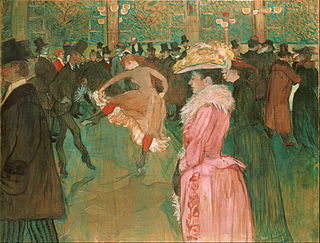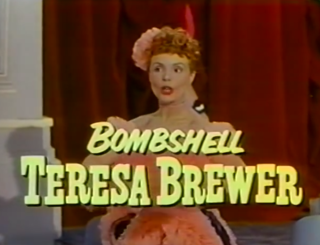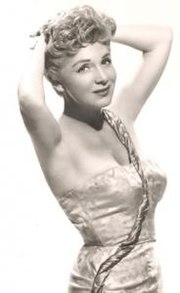
Cabaret is a form of theatrical entertainment featuring music, song, dance, recitation, or drama. The performance venue might be a pub, a casino, a hotel, a restaurant, or a nightclub with a stage for performances. The audience, often dining or drinking, does not typically dance but usually sits at tables. Performances are usually introduced by a master of ceremonies (M.C.). The entertainment, as performed by an ensemble of actors and according to its European origins, is often oriented towards adult audiences and of a clearly underground nature. In the United States, striptease, burlesque, drag shows, or a solo vocalist with a pianist, as well as the venues which offer this entertainment, are often advertised as cabarets.

A double entendre is a figure of speech or a particular way of wording that is devised to have a double meaning, one of which is typically obvious, and the other often conveys a message that would be too socially unacceptable, or offensive to state directly.

Teresa Brewer was an American singer whose style incorporated pop, country, jazz, R&B, musicals, and novelty songs. She was one of the most prolific and popular female singers of the 1950s, recording around 600 songs.

Arthur Morton Godfrey was an American radio and television broadcaster and entertainer. At the peak of his success, in the early to mid-1950s, Godfrey was heard on radio and seen on television up to six days a week, at times for as many as nine separate broadcasts for CBS. His programs included Arthur Godfrey Time, Arthur Godfrey's Talent Scouts, Arthur Godfrey and His Friends, The Arthur Godfrey Digest and King Arthur Godfrey and His Round Table.

Julius La Rosa was an American traditional popular music singer, who worked in both radio and television beginning in the 1950s.

Roy James Brown was an American blues singer who had a significant influence on the early development of rock and roll and the direction of R&B. His original song and hit recording "Good Rockin' Tonight" has been covered by many artists including Wynonie Harris, Elvis Presley, Bruce Springsteen, Paul McCartney, Joe Ely, Ricky Nelson, Jerry Lee Lewis, Pat Boone, James Brown, the Doors, and the rock group Montrose. Brown was one of the first popular R&B singers to perform songs with a gospel-steeped delivery, which was then considered taboo by many churches. In addition, his melismatic, pleading vocal style influenced notable artists such as B.B. King, Bobby Bland, Elvis Presley, Jackie Wilson, James Brown and Little Richard.

Butterbeans and Susie were an American comedy duo comprising Jodie Edwards and Susie Edwards. They married in 1917, and performed together until the early 1960s. Their act, a combination of marital quarrels, comic dances, and racy singing, proved popular on the Theatre Owners Booking Association (TOBA) tour. They later moved to vaudeville and appeared for a time with the blackface minstrel troupe the Rabbit's Foot Company.

Laurie Hope Beechman was an American actress and singer, known for her work in Broadway musicals. She also had a career as a cabaret performer and recording artist. After her death, the West Bank Cafe Downstairs Theater Bar in New York was renamed the Laurie Beechman Theatre.
Frances Faye was an American cabaret and show tune singer and pianist. Born to a working-class Jewish family in Brooklyn, New York City, she was a second cousin of Danny Kaye.

Margaretha "Greta" Keller was an Austrian and American cabaret singer and actress, who worked in some Hollywood movies and television dramas.
Meri Wilson Edgmon, known professionally as Meri Wilson, was an American singer best known for singing double entendre novelty songs.

"Les Sucettes" ("Lollipops") is a French pop song written by Serge Gainsbourg and first recorded by France Gall in 1966. One of Gall's biggest hits, it was an unusually risqué song for its time, containing numerous sexually-charged double-entendres, although she had said that she was unaware of this at the time.

Julia Lee was an American blues and dirty blues musician. Her most commercially successful number was the US Billboard R&B chart topping hit "(Opportunity Knocks But Once) Snatch and Grab It" in 1947. She is best known for her trademark double entendre songs.
"Big Ten Inch Record", also known as "Big Ten-Inch ", is a rhythm and blues song written by Fred Weismantel. It was first recorded in 1952 by Bull Moose Jackson and released by King Records, originally on 10" vinyl, the most popular format at the time. The song was later covered by Aerosmith and released as part of the 1975 album, Toys in the Attic. It has been rated as one of the best double entendre songs of all time.
Boobs! The Musical: The World According to Ruth Wallis is a musical revue with lyrics and music by 1950s and 1960s star Ruth Wallis. Using 20 of Wallis' songs, Boobs! tells the story of Ruth Wallis' international career and struggles in performing her naughty songs. Boobs! The Musical opened at the Triad Theater in New York City on May 19, 2003 to critical praise.
"Uska Dara" is a 1953 song made famous by Eartha Kitt, and also recorded by Eydie Gormé. It is based on the Turkish folk song "Kâtibim" about a woman and her secretary traveling to Üsküdar. On early American recordings, this adaptation is credited to Stella Lee.

Henriette Ragon, better known as Patachou, was a French singer and actress, best-known for popularizing Georges Brassens songs by singing them before he became famous. She was an Officier of the Légion d'honneur.

Sylvia Cadeski, known professionally as Saucy Sylvia, was a Canadian-born American comedian, classically trained pianist, singer, and radio personality.

A nightclub act is a production, usually of nightclub music or comedy, designed for performance at a nightclub, a type of drinking establishment, by a nightclub performer such as a nightclub singer or nightclub dancer, whose performance may also be referred to as a nightclub act. A scheduled performance, such as a wedding gig, is a club date.
"Big Long Slidin' Thing" is a 1954 rhythm and blues song written by Leroy Kirkland and Mamie Thomas, sung by Dinah Washington, and arranged by Quincy Jones. It has been covered by a number of different artists, and has been rated as one of the best double entendre songs of all time.














